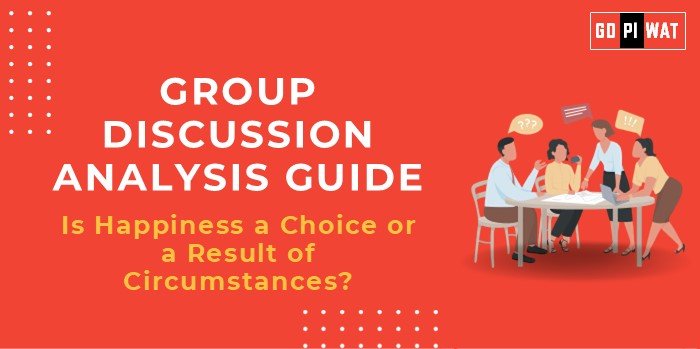📋 GD Analysis Guide: Is Happiness a Choice or a Result of Circumstances?
🌐 Introduction to the Topic
Opening Context: Happiness has been a subject of human contemplation for centuries, deeply intertwined with philosophy, psychology, and ethics. The debate over whether happiness is a conscious choice or merely a byproduct of external circumstances continues to fuel discussions in academia and beyond.
Topic Background: The concept of happiness has roots in ancient philosophies, from Aristotle’s eudaimonia—living a virtuous life—to Buddhist teachings on detachment from desires. In contemporary times, psychological studies and socio-economic indicators have added layers of complexity to the understanding of happiness.
📊 Quick Facts and Key Statistics
- 🌍 Global Happiness Index (2023): Finland ranked first for the sixth consecutive year, emphasizing the role of societal factors.
- 🧠 Mental Health Statistics: Approximately 10% of the global population struggles with depression, underscoring the impact of mental well-being on happiness.
- 💰 Income-Happiness Correlation: Studies suggest that after a certain income threshold (approx. $75,000/year in the U.S.), money’s impact on happiness diminishes.
- 📈 Choice Psychology: Research shows that individuals with a “growth mindset” report 40% higher happiness levels compared to those with a fixed mindset.
🎯 Stakeholders and Their Roles
- 🧍 Individuals: Their mindset, resilience, and personal choices influence happiness.
- 🏛️ Governments: Policies on healthcare, education, and social welfare shape collective well-being.
- 🌐 Society: Cultural norms and societal expectations significantly affect perceptions of happiness.
- 🏢 Organizations: Workplace culture and support systems impact employee happiness.
🏆 Achievements and Challenges
✨ Achievements:
- 🧘 Mindfulness Practices: The global rise of meditation and mindfulness has enhanced subjective well-being for millions.
- 📚 Positive Psychology Movement: Pioneered by Martin Seligman, it has provided tools to cultivate happiness.
- 📈 Economic Growth: Improved living standards in many countries have boosted overall happiness levels.
⚠️ Challenges:
- 🌀 Mental Health Crisis: Increasing rates of anxiety and depression worldwide challenge the narrative of happiness as a choice.
- 📉 Inequality: Socio-economic disparities limit access to resources that contribute to happiness.
🌍 Global Comparisons
- 🇧🇹 Bhutan’s Gross National Happiness Index: A model prioritizing well-being over GDP.
- 🇯🇵 Japan’s Karoshi Phenomenon: Demonstrates how societal pressures can diminish happiness despite economic prosperity.
Case Studies: Denmark’s Hygge lifestyle emphasizes coziness and community ties, contributing to high happiness rankings.
🗣️ Structured Arguments for Discussion
✔️ Supporting Stance:
“Happiness is a choice. Through practices like gratitude and mindfulness, individuals can cultivate a positive state of mind.”
❌ Opposing Stance:
“Circumstances, such as socio-economic status and health, heavily dictate one’s capacity for happiness.”
⚖️ Balanced Perspective:
“While happiness stems from both choice and circumstances, an interplay of internal mindset and external environment determines the outcome.”
🧠 Effective Discussion Approaches
💡 Opening Approaches:
- 🌀 Philosophical Question: “Does the pursuit of happiness inherently create dissatisfaction?”
- 📊 Statistics-Driven: “With over 70% of happiness variance attributed to genetics and external factors, can we truly call it a choice?”
🤔 Counter-Argument Handling:
- ✔️ Acknowledge opposing views: “Circumstances undeniably matter, but evidence shows mindset interventions can overcome adversity.”
- 🧾 Use real-world examples: “Many Holocaust survivors attribute happiness to resilience, not external conditions.”
🔍 Strategic Analysis of Strengths and Weaknesses
- ✔️ Strengths: Growing awareness of mental health; access to happiness research.
- ❌ Weaknesses: Persistent inequalities limit universal happiness.
- 🌟 Opportunities: Broader adoption of happiness-focused policies.
- ⚠️ Threats: Rising mental health issues globally.
📚 Connecting with B-School Applications
- 🌐 Real-World Applications: Exploring leadership models that foster employee happiness.
- 💡 Sample Interview Questions:
- “How can B-schools incorporate happiness science into leadership curricula?”
- “Discuss how workplace culture influences employee happiness.”
- 🎓 Insights for B-School Students:
- Understanding happiness dynamics can enhance people management skills.
- Linking happiness research with CSR initiatives adds value to business strategies.


